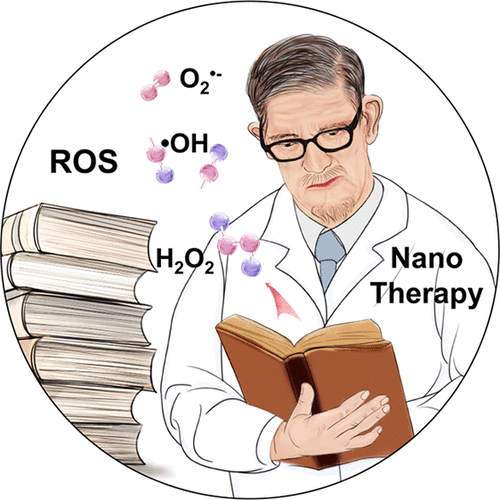当前位置:
X-MOL 学术
›
Chem. Rev.
›
论文详情
Our official English website, www.x-mol.net, welcomes your
feedback! (Note: you will need to create a separate account there.)
Reactive Oxygen Species (ROS)-Based Nanomedicine.
Chemical Reviews ( IF 51.4 ) Pub Date : 2019-04-11 , DOI: 10.1021/acs.chemrev.8b00626 Bowen Yang 1, 2 , Yu Chen 1 , Jianlin Shi 1
Chemical Reviews ( IF 51.4 ) Pub Date : 2019-04-11 , DOI: 10.1021/acs.chemrev.8b00626 Bowen Yang 1, 2 , Yu Chen 1 , Jianlin Shi 1
Affiliation

|
Reactive oxygen species (ROS) play an essential role in regulating various physiological functions of living organisms. The intrinsic biochemical properties of ROS, which underlie the mechanisms necessary for the growth, fitness, or aging of living organisms, have been driving researchers to take full advantage of these active chemical species for contributing to medical advances. Thanks to the remarkable advances in nanotechnology, great varieties of nanomaterials with unique ROS-regulating properties have been explored to guide the temporospatial dynamic behaviors of ROS in biological milieu, which contributes to the emergence of a new-generation therapeutic methodology, i.e., nanomaterial-guided in vivo ROS evolution for therapy. The interdependent relationship between ROS and their corresponding chemistry, biology, and nanotherapy leads us to propose the concept of "ROS science", which is believed to be an emerging scientific discipline that studies the chemical mechanisms, biological effects, and nanotherapeutic applications of ROS. In this review, state-of-art studies concerning recent progresses on ROS-based nanotherapies have been summarized in detail, with an emphasis on underlying material chemistry of nanomaterials by which ROS are generated or scavenged for improved therapeutic outcomes. Furthermore, key scientific issues in the evolution of ROS-based cross-disciplinary fields have also been discussed, aiming to unlock the innate powers of ROS for optimized therapeutic efficacies. We expect that our demonstration on this evolving field will be beneficial to the further development of ROS-based fundamental researches and clinical applications.
中文翻译:

基于活性氧(ROS)的纳米医学。
活性氧(ROS)在调节活生物体的各种生理功能中起着至关重要的作用。ROS的固有生化特性是活生物体生长,适应或衰老所必需的机制的基础,已经驱使研究人员充分利用这些活性化学物质为医学发展做出贡献。由于纳米技术的显着进步,人们探索了多种具有独特的ROS调节特性的纳米材料,以指导ROS在生物环境中的时空动态行为,这为新一代治疗方法的出现做出了贡献,即纳米材料指导体内ROS的进化以进行治疗。ROS与其相应的化学,生物学,纳米疗法使我们提出了“ ROS科学”的概念,该概念被认为是研究ROS的化学机理,生物学效应和纳米治疗应用的新兴科学学科。在这篇综述中,已详细总结了有关基于ROS的纳米疗法的最新进展的最新研究,重点是产生或清除ROS的纳米材料的基础材料化学,从而改善了治疗效果。此外,还讨论了基于ROS的跨学科领域发展中的关键科学问题,旨在释放ROS固有的能力以优化治疗效果。
更新日期:2019-04-11
中文翻译:

基于活性氧(ROS)的纳米医学。
活性氧(ROS)在调节活生物体的各种生理功能中起着至关重要的作用。ROS的固有生化特性是活生物体生长,适应或衰老所必需的机制的基础,已经驱使研究人员充分利用这些活性化学物质为医学发展做出贡献。由于纳米技术的显着进步,人们探索了多种具有独特的ROS调节特性的纳米材料,以指导ROS在生物环境中的时空动态行为,这为新一代治疗方法的出现做出了贡献,即纳米材料指导体内ROS的进化以进行治疗。ROS与其相应的化学,生物学,纳米疗法使我们提出了“ ROS科学”的概念,该概念被认为是研究ROS的化学机理,生物学效应和纳米治疗应用的新兴科学学科。在这篇综述中,已详细总结了有关基于ROS的纳米疗法的最新进展的最新研究,重点是产生或清除ROS的纳米材料的基础材料化学,从而改善了治疗效果。此外,还讨论了基于ROS的跨学科领域发展中的关键科学问题,旨在释放ROS固有的能力以优化治疗效果。































 京公网安备 11010802027423号
京公网安备 11010802027423号